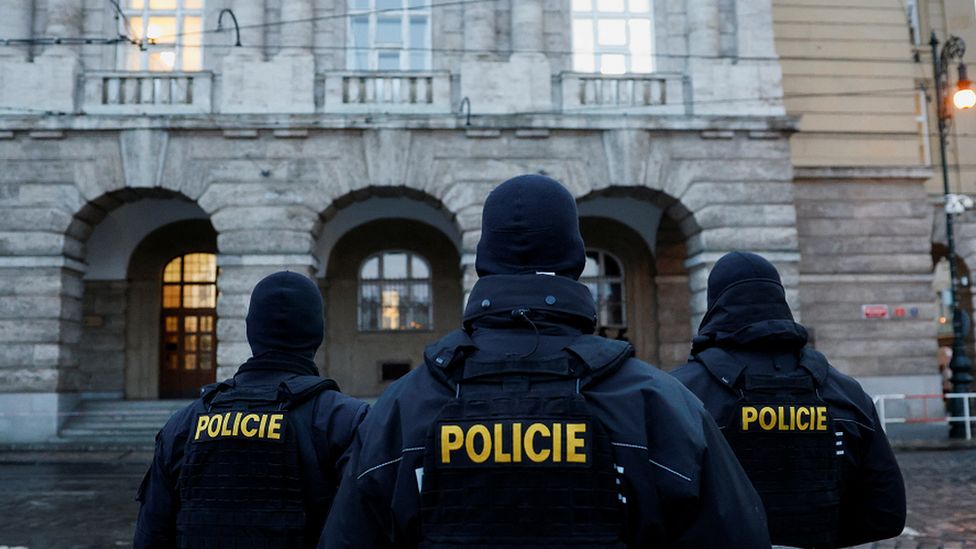Czech Republic MPs vote to tighten gun laws
- Published

14 people were shot dead at Charles University in December
MPs in the Czech Republic have approved an amendment tightening gun legislation, a month after the worst mass shooting in the country's history.
The amendment - which was proposed before the killings - must still pass through the senate and be signed by the president, and will not come into force until 2026.
It's far from revolutionary. So would it even have made a difference?
When a 24-year-old graduate student with a history of depression shot dead 14 people at Charles University in December, he did so as a licenced gun user with eight legally-owned weapons.
Police believe his victims - students and staff - were killed with a pistol, but the shooter was also carrying an AR-10 semi-automatic assault rifle.
That gun became a symbol of the attack when he was captured on video with it, roaming the balustrade of the Arts Faculty and taking potshots at passers-by, injuring several.
Moments later he threw the rifle down to the cobbled pavement and turned yet another weapon - a shotgun - on himself.
It later transpired he had acquired seven of the weapons in quick succession in the spring of 2023. No-one questioned the purchases; he had no criminal record and he held a valid gun licence.
No alarm bells were rung, nor could they be. There is no central control mechanism to warn the police that someone is amassing an arsenal.
The gun licence had also been acquired relatively recently - and easily.
The application has to be signed by a doctor, but they are unlikely to have known about the man's reported history of psychiatric problems. These would have been treated by a psychiatrist with no legal obligation to inform the doctor of them.
The legal amendment - proposed long before the shooting - could close some of these loopholes. It envisages a revamped online register of both guns and their owners. Doctors - including psychiatrists - should have access to it.
Gun shops will be legally required to report purchases they deem suspicious. The system should also flag people acquiring numerous weapons.
Police will also be given greater powers to seize weapons as a precaution before any offence has been committed.
But there will still be no mandatory psychological tests to obtain a gun licence, as is common in other countries. Czech doctors can - but do not have to - request them before signing the form.
There may be further amendments toughening up the legislation on its journey through parliament. But they are almost certain to leave untouched the fundamental right to carry a weapon in the first place - an odd obsession in one of the safest countries in Europe.
In 2021, the Czech Constitution was amended to include the right to bear arms in self-defence after a massive petition campaign that was prompted by EU moves to limit the possession of weapons, including legal ones.
There are now more than 300,000 licenced gun owners - and more than a million guns - in the Czech Republic, a country of 10.7 million people.
The Czechs are a nation of deer and wild boar hunters - not to mention biathlon fans. But the vast majority of licences are granted for personal protection, not for hunting or competitive shooting.
Why they need them for the streets of Prague and Brno is unclear.
Related Topics
- Published22 December 2023
- Published28 December 2023